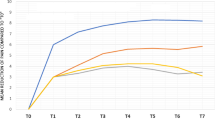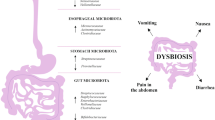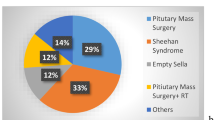Abstract
Proton pump inhibitors (PPIs) are one of the most frequently prescribed medications across the globe. Esomeprazole is the S-isomer of omeprazole, and it is currently the most widely prescribed PPI. The safety profile of esomeprazole is extremely favorable with only minor side effects, like headache and diarrhea, that are encountered in day to day practice. We report a case of a young female with symptoms of gastroesophageal reflux disease who developed galactorrhea after starting esomeprazole therapy. Resolution of galactorrhea after stopping the drug and self-rechallenge by the patient herself with reappearance of galactorrhea confirmed the culprit to be esomeprazole only. We postulate that esomeprazole may have a mild inhibitory effect on CYP3A4, which leads to decreased metabolism of estrogen, thereby increasing serum estrogen levels. Estrogen causes stimulation and production of prolactin release, which results in development of galactorrhea. This is the first case of esomeprazole induced galactorrhea, to the best of our knowledge.

Similar content being viewed by others
References
Richter JE, Kahrilas PJ, Johanson J, et al. Efficacy and safety of esomeprazole compared with omeprazole in GERD patients with erosive esophagitis: a randomized controlled trial. Am J Gastroenterol. 2001;96:656–65.
Castell DO, Kahrilas PJ, Richter JE, et al. Esomeprazole (40 mg) compared with lansoprazole (30 mg) in the treatment of erosive esophagitis. Am J Gastroenterol. 2002;97:575–83.
Gralnek IM, Dulai GS, Fennerty MB, Speigel BMR. Esomeprazole versus other PPIs in erosive esophagitis: a meta-analysis of randomized clinical trials. Clin Gastroenterol Hepatol. 2006;4:1452–8.
Davies M, Wilton LV, Shakir SA. Safety profile of esomeprazole: results of a prescription-event monitoring study of 11,595 patients in England. Drug Saf. 2008;31(4):313–23.
Halbreich U, Kahn LS. Hyperprolactinemia and schizophrenia: mechanisms and clinical aspects. J Psychiatr Pract. 2003;9(5):344–53.
Molitch ME. Disorders of prolactin secretion. Endocrinol Metab Clin North Am. 2001;30:585–610.
Petit A, Piednoir D, Germain ML, Trenque T. Drug-induced hyperprolactinemia: a case-non-case study from the national pharmacovigilance database. Therapie. 2003;58(2):159–63 (In French).
Izquierdo POM, Moreno AE, Rosillo GA. Galactorrhea induced by lansoprazole. Aten Primaria. 2004;34(6):325–6.
Jabbar A, Khan R, Farrukh SN. Hyperprolactinaemia induced by proton pump inhibitor. J Pak Med Assoc. 2010;60(8):689–90.
Andersson T, Hassan-Alin M, Hasselgren G, Röhss K. Drug interaction studies with esomeprazole, the (S)-isomer of omeprazole. Clin Pharmacokinet. 2001;40(7):523–37.
Wedemeyer RS, Blume H. Pharmacokinetic drug interaction profiles of proton pump inhibitors: an update. Drug Saf. 2014;37(4):201–11.
Shull JD, Gorski J. Estrogen regulation of prolactin gene transcription in vivo: paradoxical effects of 17 beta-estradiol dose. Endocrinology. 1989;124(1):279–85.
Freeman ME, Kanyicska B, Lerant A, Nagy G. Prolactin: structure, function, and regulation of secretion. Physiol Rev. 2000;80(4):1523–631.
Halbreich U, Kinon BJ, Gilmore JA, Kahn LS. Elevated prolactin levels in patients with schizophrenia: mechanisms and related adverse effects. Psychoneuroendocrinology. 2003;28(Suppl 1):53–67.
Rosenshein B, Flockhart DA, Ho H. Induction of testosterone metabolism by esomeprazole in a CYP2C19*2 heterozygote. Am J Med Sci. 2004;327(5):289–93.
Molitch ME. Medication induced hyperprolactinaemia. Mayo Clin Proc. 2005;80:1050–7.
Author contributions
Nirav Pipaliya structured and wrote the manuscript. Dattatray Soalnke and Chetan Rathi helped searching the literature. Ruchir Patel collected the patient's data. Meghraj Ingle and Prabha Sawant guided the whole case writing.
Author information
Authors and Affiliations
Corresponding author
Ethics declarations
Conflict of Interest:
None.
Human Rights:
All procedures followed have been performed in accordance with the ethical standards laid down in the 1964 Declaration of Helsinki and its later amendments.
Informed Consent:
Informed consent was obtained from all patients for being included in the study.
Rights and permissions
About this article
Cite this article
Pipaliya, N., Solanke, D., Rathi, C. et al. Esomeprazole induced galactorrhea: a novel side effect. Clin J Gastroenterol 9, 13–16 (2016). https://doi.org/10.1007/s12328-015-0622-7
Received:
Accepted:
Published:
Issue Date:
DOI: https://doi.org/10.1007/s12328-015-0622-7




